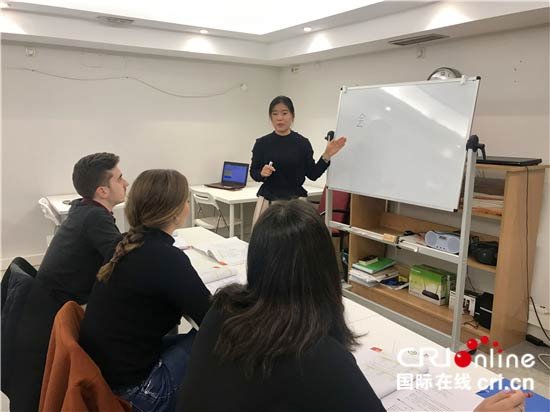In recent years, Chinese has gained more and more popularity in Spain. Among the second foreign language courses offered in many Spanish schools, Chinese is even favored over French, Germany, Italian and other traditional European languages. Spain has registered the largest number of Chinese Proficiency Test (HSK) takers among European countries for several consecutive years.
Adrian, 16, started learning Chinese at the age of 7. He participated in a Chinese summer camp last year in the city of Chengdu, Sichuan province, during which his passion for Chinese learning was further stimulated by Chinese culture and cuisine.
“What do you think of Chengdu?”
“Very good, I like it.”
“Chengdu cuisine is quite spicy. Do you like it?”
“I like spicy food. Really like it. ”
Like Adrian, more and more Spanish people, amounting to almost 50,000, have been keen to learn Chinese in recent years. Zhang Li, the representative of the Spain Office of Hanban said, “The development of Chinese language in Spain started a bit later than it did in the UK, France, Germany and even Italy. Real Chinese language teaching in Spain gradually started after 2000. The number of Chinese language learners has increased fivefold in the past decade from less than 10,000 in 2008.”
Spanish students in Chinese language class
Not only are there more and more people learning Chinese, but the number of HSK takers in Spain has also ranked first in European countries for 7 consecutive years, reaching 8,000 to 9,000. Why are Spanish people so keen to learn Chinese in recent years? Zhang Li, who has been promoting Chinese in Spain for more than ten years, finds the answer to the question from her own experiences. She said, “I feel that the development of Chinese across Spain has gradually seen a steady growth and it has become a practical need to learn Chinese. In the very early stage, people simply thought of Chinese as a popular and trendy foreign language. But now, they have formed a more rational view on Chinese and they have a strong desire to learn Chinese out of practical needs. One reason for this change is that given economic growth in China, they believe that they may get better opportunities after learning Chinese. The other, in my opinion, is that they are really attracted by Chinese culture. As the exchanges between China and Spain become even more frequent in recent years, Spanish people come to know more about Chinese culture. They may want to learn Chinese well in order to have a better understanding of the country, as well as the culture.”

All ears
The Chinese name of Karla Flores, a Spanish girl, is Gao Erya, whose experience of learning Chinese reflects the changes Zhang mentioned above. She studied Chinese first at the well-known Faculty of Translation and Interpreting of the University of Granada in Spain, and then at the Beijing Language and Culture University. Gao Erya can speak Chinese fluently, but she did not realize the impact of learning Chinese on her life at the very beginning. She said, “I started learning Chinese in 2007 when I was in university. If you ask me now why I chose to learn Chinese at that time, I would not know the answer. I just did it. At that time, I did not know that much about Chinese or China. But later, I fell in love with this language and now I still have great love for it. To be honest, I did not know at that time that the choice of learning Chinese would have such an impact on my whole life later on.”
Chinese characters exercise book of a Spanish student
At present, Gao is working on tourism and language teaching related to China. In the near future, Chinese will influence the lives of more and more Spanish people, not only her. According to Zhang, Chinese language teaching is thriving in Spain. “Among 70 universities in Spain, including both public and private universities, more than 50 of them offer Chinese courses,” she said, “There are about 100 primary and secondary schools in Spain offering Chinese courses. It is particularly noteworthy that such courses have begun to be offered at public primary and secondary schools, which are mainly concentrated in Andalusia in southern Spain. This year, there are 32 public primary and secondary schools in this region that offer Chinese courses, up from 26 in the past. What’s more, those schools also include Chinese courses in the national education system, which means Chinese has been included in the national curriculum. In the Castile and León, two secondary schools have included Chinese courses into their education system as a second foreign language.”
During the interview, a few words by Gao Erya impressed the journalist. She said, “When I started learning Chinese, everyone told me that Chinese was a language of the future. Now, I think the future has already come and Chinese is a language of the present.” (cited from Confucius Institute Headquarters, source: CRI Online, Story by Jia Yanning)





